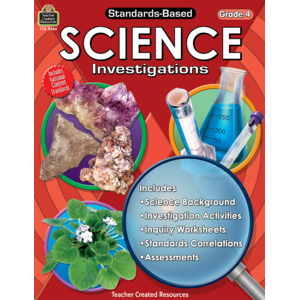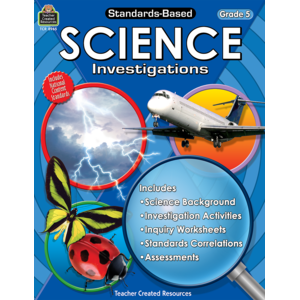Aside from being highly motivating and fun, science investigations provide an excellent opportunity for students to question the world in new and creative ways. The thinking skills a child develops while doing a science project are the same basic skills that will be used throughout life—to sense and clarify problems that exist and to find creative solutions to those problems. After a thorough review of the scientific process, allow students to guide their own learning by selecting a science investigation. Determine if you want students to work independently, with a partner, or with a small group.
Below is a list of ideas from which students may want to choose. Students will have to consider how they will conduct the investigation as well as how to present their investigation process and findings for review by the class or teacher.
Tip: You may want to do several science investigations as a class prior to assigning students to do one independently so that students gain an understanding of what is expected both of the process and the presentation.
Level 1
1. How much salt does it take to float an egg?
2. What kind of juice cleans pennies best?
3. Which dish soap makes the most bubbles?
4. On which surface can a snail move faster—dirt or cement?
5. What brand of raisin cereal has the most raisins?
6. Do ants like cheese or sugar better?
7. In my class who is taller—the boys or the girls?
8. Do different types of apples have the same number of seeds?
9. Do mint leaves repel ants?
10. What materials dissolve in water?
11. Do all objects fall to the ground at the same speed?
12. Do wheels reduce friction?
13. Can things be identified by just their odors?
14. With which type of battery do toys run on longest?
Level II
1. How far does a snail travel in one minute?
2. How far can a person lean without falling?
3. Can you tell time without a watch or a clock?
4. Does the shape of a kite affect its flight?
5. Does an ice cube melt faster in air or water?
6. How much of an orange is water?
7. Does baking soda lower the temperature of water?
8. Does the color of water affect its evaporation?
9. Can you separate salt from water by freezing?
10. Do suction cups stick equally well to different surfaces?
11. Which cheese grows mold the fastest?
12. Which kind of cleaner removes ink stains best?
13. Which gets warmer—sand or dirt?
14. What kind of glue holds two boards together better?
Level III
1. What type of line carries sound waves best?
2. Does an earthworm react to light and darkness?
3. Is using two eyes to judge distance more accurate than using one eye?
4. What materials provide the best insulation?
5. Do different kinds of caterpillars eat different amounts of food?
6. Do boys or girls have a higher resting heart rate?
7. Do liquids cool as they evaporate?
8. Which way does the wind blow most frequently?
9. Which dish soap makes the longest lasting suds?
10. How accurately can people judge temperatures?
11. Does the length of a vibrating object affect sound?
12. What common liquids are acid, base, or neutral?
13. Who can balance better on the balls of their feet—boys or girls?
14. Does sound travel best through solids, liquids, or gases?

I love your Level 1 ideas. These are all activities I could do with my Kindergarteners. They seem like a lot of fun!!
Hi my names is Justine, im in 5th grade, I need help for finding what type of soap makes the longest lasting bubbles.
Like examples:
What I need to start with.
The materials.
The names of the soap.
Just tell me what I need to know, how to get in A in my 5th grade science fair project.
Hey there Justine,
Looks like you have a good question to find the answer too. So now you need to gather several types of dishwashing soap and experiment with it. Follow the directions for using the soap and compare the various bubbles you create. You should label each sink of bubbles with the brand of soap before you take a picture of it. Always take the picture from the same angle. You might also want to measure how high and how wide an area the bubbles cover. Once you have that information for many types of soap you should have the answer to your question. For some good information on how to put this all together, take a look at TCR2221 Science Fair Projects.